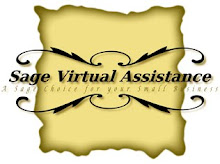How to protect your online information
In my business, clients worry about their privacy, rightly so, it seems even Banks and Obama's hand held are fair game to hackers. We work with secure companies to do our online business. We are not perfect but we work hard at making sure your information is not breech able. There are simple steps we can take to ensure our online life is safe and secure from hackers and people who are up to no good.
Scanning the internet, I found this article and wanted to share. I found it at:
ehow.com...
In my business, clients worry about their privacy, rightly so, it seems even Banks and Obama's hand held are fair game to hackers. We work with secure companies to do our online business. We are not perfect but we work hard at making sure your information is not breech able. There are simple steps we can take to ensure our online life is safe and secure from hackers and people who are up to no good.
Scanning the internet, I found this article and wanted to share. I found it at:
ehow.com...
By eHow Internet Editor
You shop online. You bank online. You communicate online. The Internet has allowed us to do almost everything online, but it has also allowed hackers and thieves to obtain your private information online. Is your Internet security in jeopardy? Evaluate your online practices. If you think you could beef up your Internet security, read on. Adequate Internet security is possible with the following steps.
Step1
Never share any username or password with anyone else. Make sure your passwords are strong and hard to decipher so that no one else can guess them. Step2
Fill out information and download files or programs only from websites you trust. Always looks for “https” at the beginning of the web address; this signifies that the site is secure. Furthermore, when you are done transmitting your information online, don't forget to log off and clear your cookies and web browser history as well. Step3
Install an Internet security program that guards against identity theft, worms and spyware. Your internet supplier should have software you can download or you can purchase something like Norton. Step4
Create an alternate email address for further Internet security. Use this new email address for completing online forms, posting in public forms or any other purpose that is public in nature. Step5
Familiarize yourself with the privacy policies of websites you frequent. It is important to understand how the sites you visit are using the information you submit online. If you do not agree with the websites’ practices such as sending you emails with advertising in them, do not submit your private information on those websites. Step6
Read your email only after downloading it off the server. Staying connected to your email while you are still online gives hackers a chance to view private information in your email. Email clients such as Eudora or Microsoft Outlook allow you to do this. Step7
Remove all your personal information and documents from your hard drive before selling or giving your computer to someone else.I hope this list helps you with your ventures in the virtual world we all now live in. Thanks to ehow, they are a world of information.


No comments:
Post a Comment
Note: Only a member of this blog may post a comment.